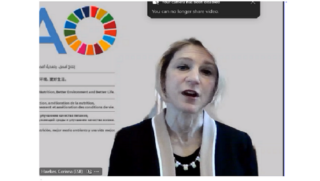Take the case of 74-year-old William B. Aossey Jr. He’s the Iowan who built Midamar Corp. and Islamic Services of America (ISA) into a successful Halal food exporter. Then, in July 2015, a jury convicted Aossey on 15 of 19 federal felony counts for removing USDA establishment numbers to misrepresent beef as being Halal when it was not.
 Aossey has been in custody since being convicted and both the prosecution and the defense have been putting forward thorough arguments about his sentencing, which is likely to be scheduled soon. One of the latest documents dropped in the case is a 19-page summary by Aossey’s Chicago attorney Haytham Faraj, who listed comparable food and food safety cases in the federal courts.
Aossey has been in custody since being convicted and both the prosecution and the defense have been putting forward thorough arguments about his sentencing, which is likely to be scheduled soon. One of the latest documents dropped in the case is a 19-page summary by Aossey’s Chicago attorney Haytham Faraj, who listed comparable food and food safety cases in the federal courts.
At issue is whether Aossey’s sentence should be enhanced because he used “sophisticated means” to commit the crimes, misused his position of trust and/or committed a crime with more than 10 victims. Faraj says his client should not be subject to the sentence enhancement points and argues instead for credit, saying Aossey accepted responsibility.
“Since the beginning of the investigation defendant never denied the factual allegations. He admitted to mislabeling the meat from the start. He testified at trial that he knew it was wrong to change the labels but did not think it was very serious,” Faraj says. “The point is, defendant acknowledged his conduct but chose to go to trial once the heavy-handed government charged him with a variety of federal offenses including conspiracy, wire fraud, and money laundering. In sum, defendant admitted to the factual allegations but denied an intent to defraud and conspiring with others. Thus, defendant should not be penalized for exercising his constitutional right to a trial by jury because he disagreed with the government’s legal conclusions.”
Richard L. Murphy, the assistant U.S. Attorney heading the prosecution team, filed a 30-page sentencing memorandum seeking the “imposition of a sentence of imprisonment within the sentencing guidelines range determined by the court, a final order of forfeiture in the amount of $184,938.68, and a substantial fine, consistent with the defendant’s ability to pay.”
The pre-sentence report for Aossey recommends a 14-level increase in the offense level based on a loss amount of $740,212.77, according to the prosecution’s document.
The government and the defense do not agree about the number of victims involved in Aossey’s offenses.
“The United States is continuing to attempt to identify persons claiming to be victims of the criminal conduct. As authorized by the court, the government did issue a press release intended to advise potential victims of their rights. However, to date, the United States has found no evidence this press release was published by any media outlets, thus it is not all clear any potential victims are aware of their right to submit a statement,” Murphy’s memo says. “As noted in the offense conduct statement, the precise number of victims is not easily quantified, however, by virtue of the conduct and fraud involved it is seems clear the number of victims would have easily exceeded ten.”
Aossey’s attorney Faraj sees it differently.
“Further, it is defendant’s position there are no victims to this offense, accordingly, because there are no victims defendant could not have abused a position of trust in order to influence the victims in order commit the offense,” Faraj wrote. “Defendant and the foreign purchasers had a normal business relationship. The purchasers ordered a product and received what they ordered. The purchasers never complained and defendant did not exert a position of trust over the foreign purchasers. Thus, based on the facts of this case an enhancement based on Defendant abusing a position of trust is not applicable.”
The government, however, did ask Muslims about the misbranding.
“The United States has recently spoken to a representative of a Muslim consumer group for food products. According to that representative, many, if not most, Muslim consumers would take the conduct in this case seriously and would expect and depend upon the information represented by Midamar and ISA on packaging and elsewhere to be accurate,” Murphy said. He argues the defendants fraudulent conduct, which adversely affected a large number of Muslim consumers, can be considered at sentencing.
Murphy says the “defendant testified at trial he ‘requested and instructed’ people at Midamar to re-box, re-label, and ship beef to Malaysia. Defendant was very particular and concerned that the USDA establishment numbers be completely removed so no one could detect the fraud. As defendant admitted, he wanted everyone to ‘do it right’ even though what [they were] doing [was] wrong.”
He added that the “ defendant lied to the Malaysians in order to secure the approval of Malaysia to continue to export unauthorized beef products to that country. In doing so, defendant plied upon his 40 years in the business and the trusting relationships developed over that time.”



